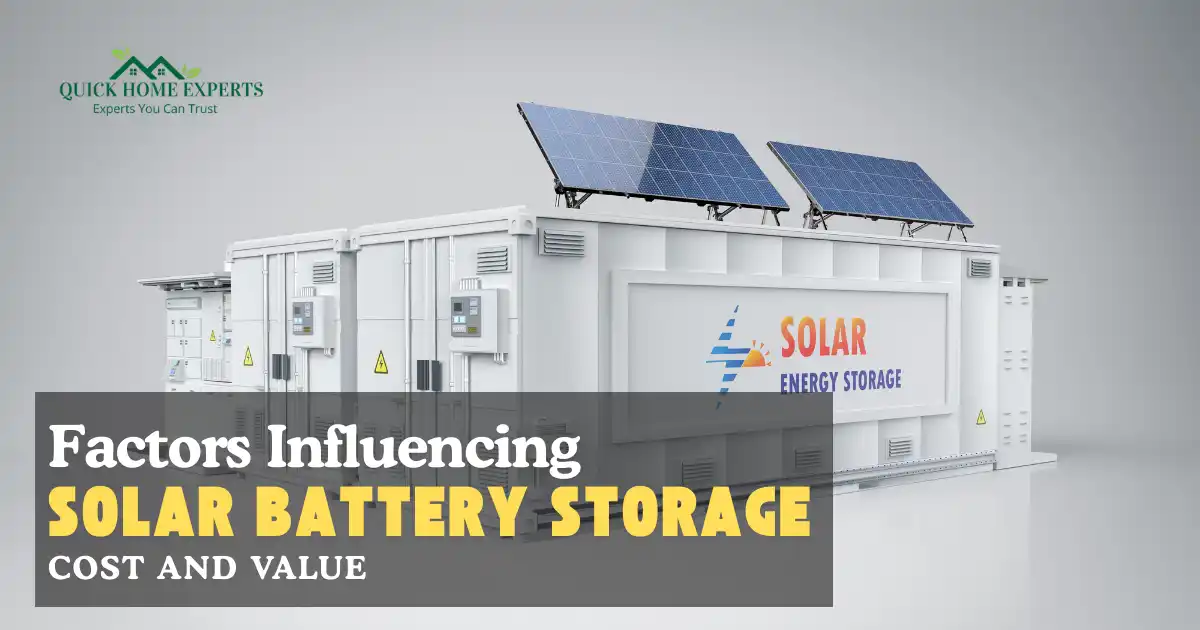Solar energy becomes more popular day by day and many homeowners are considering whether adding battery storage to their solar system is a smart investment. Solar batteries promise energy independence, backup power during outages, and the ability to maximize your solar savings. But are they really worth the cost for your home?
In this detailed guide, we’ll discuss the benefits and disadvantages of the solar battery storage. We’ll also go over the cost involved, that it’s sensible and the best way to select the most suitable solution for your requirements. If you’re only getting started with solar energy, or want to upgrade your system this guide will help you in making a well informed decision.
What Is Solar Battery Storage?
The storage of solar battery allows you to save the extra energy generated by solar panels. This power can be utilized later for instance, during evening, power outages or when your energy bills are the highest. Instead of transmitting all excess solar energy to grid power, keep this energy in your home and utilize it when you require it the most.

Key Points:
- The solar batteries typically of lithium ion. However, other types are also available.
- They are able to be installed with new solar systems or also fitted to existing solar systems.
- The battery storage feature is beneficial in locations in which there are frequent power outages, large electric rates or no net meters.
Cost of Solar Battery Storage by Battery Type
| Battery Type | Installed Cost (per kWh) | Typical Size (kWh) | Total Installed Cost (2025) |
|---|---|---|---|
| Lithium Ion (e.g., Tesla Powerwall) | $900 – $1,400 | 10 – 20 | $9,000 – $20,000 |
| Lead-Acid | $600 – $1,000 | 8 – 16 | $5,000 – $12,000 |
| Saltwater | $1,000 – $1,500 | 10 – 20 | $10,000 – $25,000 |
| Flow Battery | $1,200 – $2,000 | 10 – 20 | $12,000 – $30,000 |
Cost of Solar Battery Storage by Home Size and Usage
| Home Size/Usage | Recommended Battery Size | Typical Installed Cost (2025) |
|---|---|---|
| Small Home (<1,500 sq ft) | 5–10 kWh | $5,000 – $12,000 |
| Medium Home (1,500–2,500 sq ft) | 10–15 kWh | $10,000 – $18,000 |
| Large Home (>2,500 sq ft) | 15–20+ kWh | $15,000 – $25,000+ |
| Very High Use (EV, pool, etc.) | 20+ kWh | $20,000 – $35,000+ |
Factors Influencing Solar Battery Storage Cost and Value

- Type of battery: Lithium ion is a good option to go however flow batteries or lead acid are also a good alternatives.
- System Size: More storage means greater cost.
- Quality of the Brand, Warranty and Service: The top manufacturers (Tesla, LG, Enphase) may cost more however, they’ll offer more reliable warranties.
- Installation Complexity: Fitting of these electrical upgrades and backup panels can increase the cost.
- Rebates and tax credits for incentives: The federal State tax or local incentive programs, and utility rebates could reduce expenses.
- Net Metering and Utility Rates: Time of usa rates as well as the limitation of net metering make batteries more effective.
- Backup Needs: Are you looking for an entire home backup, or the basics?
- Temperature: Extremely cold temperatures could affect battery performance and prolong the duration of the battery’s life.
Pros and Cons of Solar Battery Storage
Pros
- Energy Independence: Utilize the power of solar energy generated by your own both during the day and at night.
- Backup Power: Ensure that appliances and lights are on in the case of grid malfunctions.
- The Amount of solar savings: Store any extra energy to use during periods of high frequency or at night.
- Reduce Carbon Use: Use more clean energy and in contrast use less grid power.
- Potential incentives: Rebates and tax credits can reduce the initial costs.
- Quiet and Low Maintenance: No noise or fuel like a generator.
Cons
- A significant initial cost: Batteries are expensive, even though prices are dropping.
- Limited Lifespan: The majority of batteries lifespan is between 10 and 15 years which is lower than solar panels.
- Cost effective, but not always: In areas with full net metering, the payback time can take a long time.
- Capacity Limits: You can’t provide power to your entire home for a prolonged period of time during power outages.
- Maintenance: Some batteries require regular checks.
When Does Solar Battery Storage Make Sense?
- Regular Power Outages: If you live in a place with a weak grid, power batteries provide protection.
- Time of Use Rates: If you pay more for utilities than usual, a battery backup can help save money.
- Network metering limits: If you’re not able to market excess power via grid energy, the idea of storing it would be logical.
- Energy Independence: Want to not be dependent on grids or totally free of grid.
- Power backup for Different Devices: It’s Vital for those devices like ( medical ) who require continuous power.
- Environmental Goals: Increase your use of clean, renewable power sources.
How to Choose the Right Solar Battery for Your Home

1. Assess Your Energy Needs:
- Check your electric bills to figure out your typical use.
- Choose if you want the complete backup of your home, or just the essentials.
2. Choose the Right Battery Type:
- Lithium Ion is currently the most well known option in home owners (best mix of, longevity as well as performance and cost).
- Lead acid is a good budget option or alternative to the grid.
- Saltwater or Flow to meet the specific needs.
3. Check Compatibility:
Make sure whether the battery is able for use with solar system and system.
4. Compare Brands and Warranties:
You should be looking for at least 10 years of guarantee and positive customer reviews.
5. Get Multiple Quotes:
Compare costs for the quality of installation, prices and customer support.
6. Ask About Incentives:
Credit to federal taxes (30 percent until 2025) State/local rebates, as well as utilities rebates.
7. Plan for the Future:
Imagine the energy needs of the future (EV or home improvement, etc. ).
Installation, Maintenance, and Lifespan of Solar Battery Storage

Installation:
- An installation by a professional is recommended for security as well as to ensure guarantee.
- It is possible in order to update electrical appliances, or another panel.
Maintenance:
- Lithium ion low maintenance and monitoring via an app.
- Always check for water levels and corrosion.
- Keep batteries in a temperature controlled area for best performance.
Lifespan:
- Lithium ion : 10-15 years (4,000-6,000 cycles)
- Lead Acid: 5-10 Years
- Flow/Saltwater: 10-20years
Signs You Need Replacement:
- Storage capacity is reduced
- System problems and frequent downtimes
- Warranty period expires.
Conclusion
Storage of solar batteries could be a fantastic option for homeowners looking to gain the ability to be independent of their energy sources in addition to backup power and control over the use in terms of energy. While the initial cost may be costly however, the benefits particularly in areas with frequent interruptions in power, high utility costs and no net meteringcould make the purchase of batteries worth it.
Before you purchase, review your needs, research options, and take advantage of the discounts that are offered. If you select the best home system, you’ll be able to relax, have less expenses, and a better home for the long run. be.
FAQs
What do solar batteries cost?
The majority of systems are priced within the $9,000–$20,000 range. The price is determined by the size and model.
How long does a solar battery last?
Lithium-ion batteries last between 10 and 15 years, whereas lead-acid batteries last 5–10 years.
Can I add a battery to my existing solar array?
Yes, but make sure you verify the compatibility of your inverter with your system.
Will batteries power my entire home in the event of a power outage?
It depends on the battery’s capacity and your power demands. Most systems are designed to back up only the essentials.
Are there any incentives for solar batteries?
Yes! Federal tax credits (30% through 2025) and a variety of local or state rebates are available.
Is solar battery storage worth it if you have net metering?
It might be less cost-effective, but it still allows you to store energy and provides backup power.
How do I ensure my solar battery is in good working order?
Lithium-ion batteries require little maintenance, while lead-acid batteries need frequent inspections.
